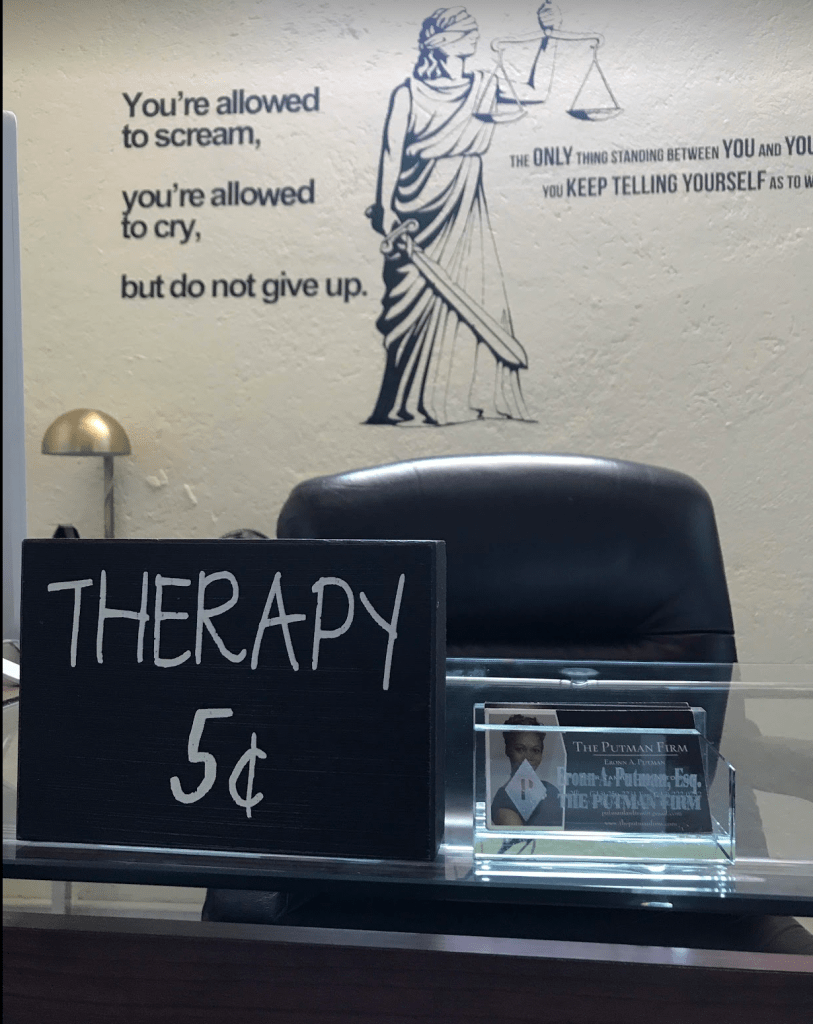By: E.A. Putman

As divorce lawyers, we are trained to handle the legal aspects of a case, but we can only do so much when it comes to the emotional turmoil that often accompanies divorce. We can provide you with the tools to litigate fault grounds, but we cannot assist you in healing the underlying issues that led to the divorce.
There’s a professional for everything. I remember having a consultation a few years ago and asking a potential client if he considered talking to a therapist. He had non-legal issues he expected me to resolve. This man damn near threw the nearest object at me. So, while I hesitate to speak those words aloud to people in litigation, I may send them this link.
Benefits of Therapy
Therapy can provide much-needed support and guidance during this difficult period. It can help individuals process their emotions, cope with the changes and challenges of the divorce, and develop effective communication and coping skills.
The process of therapy holds an impactful potential to profoundly influence emotional well-being and alleviate conflict during the tumultuous experience of divorce. By providing a secure environment for individuals to openly express their emotions, fears, and concerns, therapy serves as a vital resource in equipping them with coping strategies to navigate the complexities of their circumstances. Furthermore, therapy plays a pivotal role in improving communication and fostering mutual understanding, thereby laying the groundwork for a peaceful and harmonious resolution.
Possible Drawbacks of Therapy During Litigation
During divorce therapy, it is important to consider any legal implications that may arise. Confidentiality agreements, for instance, may need to be discussed and put in place to protect the privacy of both parties involved. Additionally, child custody arrangements may need to be taken into account and addressed during the therapy sessions.
Can my spouse subpoena my therapist?
In the state of Texas, Rule 176 of the Texas Rules of Civil Procedure governs the individuals who may be subpoenaed. However, just because someone is subpoenaed, they are not forced to testify about certain subject matter nor are required to produce certain records. Health Insurance Portability and Accountability Act (HIPAA) is a federal law that sets a national standard to protect medical records and other personal health information.
Can my Therapist Refuse to Testify/ Disclose Therapy Discussion?
According to HIPAA’s Privacy Rule, any notes made by a therapist during a psychotherapy session can only be disclosed with the client’s authorization. Much like lawyers have ethical and procedural guidelines to procure evidence, there are legal and ethical guidelines that therapists must follow. So, the only way the records are released is either voluntarily (good luck) or through a court order. Another exception is that , therapists may sometimes need to breach confidentiality in certain situations, such as when a client poses a risk of harm to themselves or others.
If any party is considering calling their spouses therapist to the stand, the primary question remains, “Is the financial cost of subpoenaing medical professionals and records worth it“. One has to consider the value of the information obtained, and ensure that the benefits outweighs the cost.
In short, there are practical considerations to choose therapy when going through a tumultous divorce. But, the benefits of being able to release the emotional turmoil far outweighs the (seemingly) harmless, if possible, testimony that will come from your therapist.
The Putman Firm, PLLC is a family law litigation firm that handles a wide array of family matters including criminal matters that intersect family law, i.e. family violence assault cases, protective orders (criminal and civil) and allegations of child abuse. If you or someone you know are seeking legal assistance for a family law case, contact The Putman Firm, PLLC at (281) 501-9033. You can also schedule a consultation by visiting Your Family Law Attorney.


